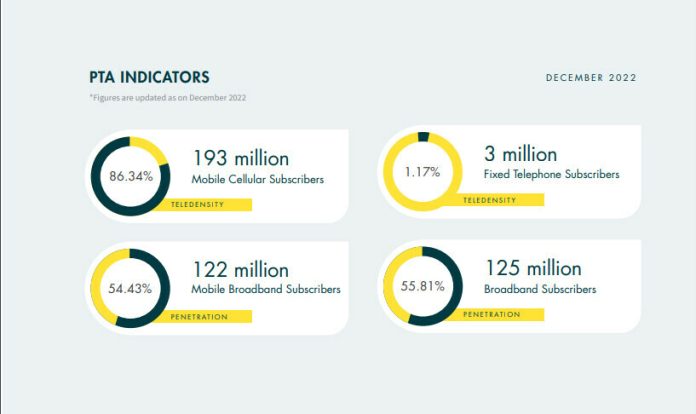
A comprehensive report that explored in detail the complex relationship between human rights and information and communication technologies in Pakistan in 2022 was launched on Monday, with its findings highlighting that the country remained among the world’s worst performers in terms of internet access and digital governance.
The report, titled ‘Pakistan’s Internet Landscape 2022’, was authored by Chief Digital Strategist and Editor at Dawn.com Jahanzaib Haque and released by human rights and advocacy organisation Bytes For All.
It said, “In terms of internet access and overall governance, Pakistan made some gains, but in the context of the world, the country remains among the worst performers, even within just Asia.”
In this respect, it highlighted that despite an increase in internet penetration, approximately 15 per cent of the population still lacked access to the internet and mobile or telecom services.
Meanwhile, the report added, the rest suffered through slow speeds and a lack of consistency in services, negatively impacting meaningful access.
“Add to this a lack of inclusivity and digital literacy, one of the biggest global gender gaps in access and a struggle to stay online due to loadshedding and blackouts brought on by an energy crisis and catastrophic floods, and a dismal picture emerges,” it said, painting a dismal picture of the country’s digital landscape.
Citing the Inclusive Internet Index of 2022, commissioned by Meta and executed by Economist Impact, the report pointed out that Pakistan ranked last out of 22 countries in Asia overall, and 79 globally across the key indicators of availability, affordability, relevance and readiness.
Moreover, “a massive gender gap in both internet access and mobile phone access for females was noted as a major issue in the country”.
Referring to the findings of the GSMA Mobile Gender Gap 2022 Report, the Bytes for All’s report said they highlighted Pakistanʼs poor standing in terms of access for females, though noting that the gap had narrowed slightly over time.
“In summary, Pakistan had the widest gender gap in mobile ownership of all countries surveyed with just half of women owning a mobile phone, as compared to over 75pc of men,” it added.
With regards to digital governance, the report concluded: “This year, both the federal and provincial governments introduced a number of online initiatives, but the momentum for a ‘Digital Pakistan’ — championed by the previous government — was hobbled by political upheaval as well as existential economic and climate crises.”
It went on to say that “the lofty dreams of a progressive and competitive ʻDigital Pakistanʼ all set to redefine the future were truly dead, with only haphazard gains made in some areas, largely driven by private enterprise or the rulings and hard work of a few dedicated individuals or teams”.
The report also highlighted the impact of catastrophic floods in the second half of 2022 in this regard, stating that they proved to be “the greatest challenge for the government, with 33 million people affected and extensive damage to infrastructure — including telecom and the internet.
This prompted a national-level response that showcased the capacity, as well as vulnerabilities, of the state.
The floods in Pakistan severely damaged the telecom and internet infrastructure, leaving thousands of flood-affected individuals and relief workers without means of communication during the emergency and for some time after, it said.
Moreover, the report’s findings concluded that cybercrime in Pakistan saw a steady rise, with over 100,000 complaints registered by December 2022, marking the highest number in the last five years.
“Women continue to face widespread harassment and blackmail online,” it said, adding that cases of blasphemy accusations originating from or connected to the digital space remained prevalent, with no meaningful action taken to address the issue.
“The online environment remains perilous, with the threat of blasphemy allegations, online campaigning, mob organising, and subsequent violence, including lynching,” the report said.
It further stated that in the past year, disinformation proliferated online, “reaching new levels of sophistication and influence”. In this regard, it particularly highlighted disinformation operations originating in India targeting Pakistan.
“The existing environment created by the state and local actors provided fertile ground for such attempts to succeed,” the report said.
Moreover, discussing the state’s efforts to control the online space — including filing cases against journalists, activists, and political opponents for expressing unfavorable views on social media — the report said attempts were also made to pass stricter defamation laws to suppress dissent.
Elsewhere, the local e-commerce and fintech sectors experienced negative trends due to the global economic downturn and Pakistan’s own crises, it said, adding that funding and deal counts for startups significantly declined in the second half of 2022.
The last quarter of the year experienced a sharp plunge in funding, making it the worst quarter on record, it said, adding that despite a decline in funding, Pakistan’s startups managed to secure $348 million in funding in 2022.
Meanwhile, internet banking transactions witnessed a steep rise of 51.7pc in the fiscal year 2022, reflecting the growing adoption of digital financial services in Pakistan, the report explained.
According to it, internet banking users increased by almost 60pc to 3.1 million in the past year.





